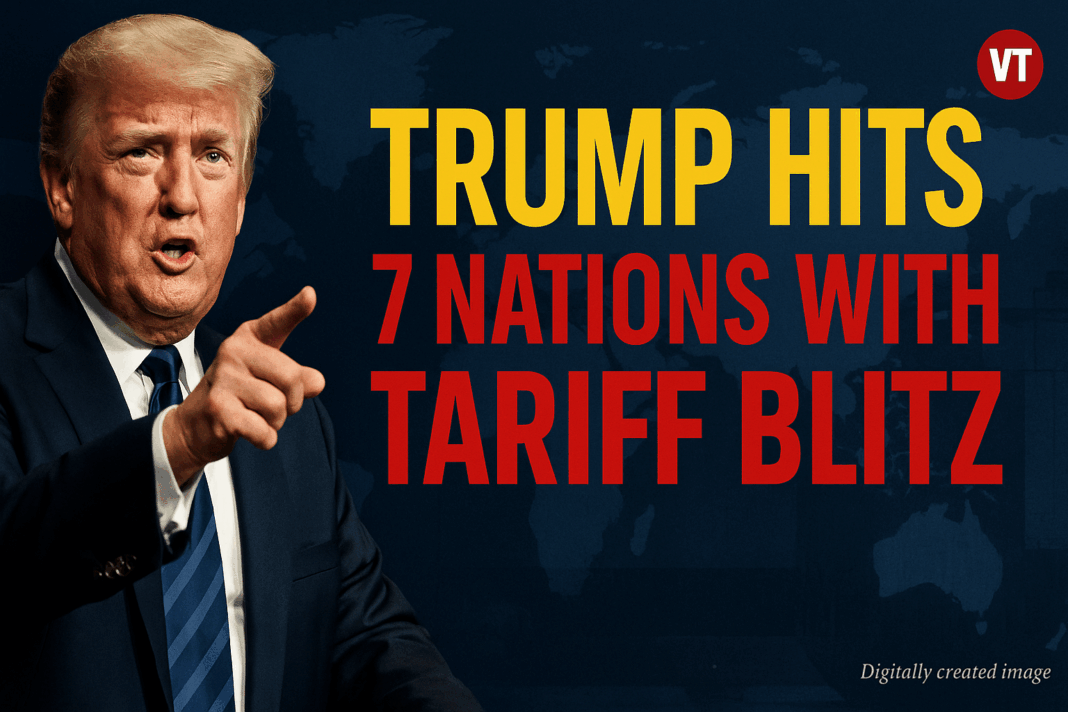- President Trump has issued formal tariff notices to Japan, South Korea, Malaysia, South Africa, Kazakhstan, Myanmar, and Laos.
- New U.S. import tariffs range from 25% to 40%, effective August 1, 2025.
- Trump warns of additional penalties if nations retaliate or maintain trade barriers.
- Countries may avoid tariffs by relocating production to the United States.
- Tariff policy framed as vital to national security and economic rebalancing.
Coordinated Trade Letters Target Asian and African Nations
In one of the boldest moves of his second-term trade doctrine, President Donald J. Trump on July 7, 2025, announced new import tariffs ranging from 25% to 40%, targeting seven countries across Asia and Africa. The initiative was launched via formal letters delivered from the White House to the heads of state of Japan, South Korea, Malaysia, South Africa, Kazakhstan, Myanmar, and Laos.
Despite being tailored with each leader’s name and nation, the letters carried a nearly identical message, emphasizing what Trump called “non-reciprocal trade relationships” and “unsustainable trade deficits.”
Tariff Breakdown by Country
| Country | Tariff Rate | Notes |
|---|---|---|
| Japan | 25% | All imported goods |
| South Korea | 25% | All imported goods |
| Malaysia | 25% | All imports |
| Kazakhstan | 25% | All imports |
| South Africa | 30% | All imports |
| Myanmar | 40% | All imports |
| Laos | 40% | All imports |
The letters cite recurring trade deficits, non-tariff barriers, and limited U.S. market access as justification. Tariffs were framed as corrective measures rather than punitive ones.
Relocation Offers: No Tariffs for U.S.-Based Production
Trump’s letters include a notable exemption: foreign companies that shift production to the United States will be spared from the tariffs. The administration promises incentives for such firms, including expedited regulatory approvals and infrastructure support.
Penalty System for Retaliation
Each letter contains a direct warning: any retaliatory tariffs imposed by the targeted nations will result in proportional increases to existing U.S. tariffs. The White House described this as a “scaled penalty system” to deter backlash and preserve leverage.
Identical Messaging, Nationalistic Tone
Though customized per recipient, the letters emphasize the same themes:
- The U.S. has been “overly generous.”
- Past trade deals lacked “true reciprocity.”
- The U.S. is “reclaiming its economic autonomy.”
The messages, bearing Trump’s distinctive signature and the White House seal, position the tariff initiative as both economic correction and geopolitical assertion.
Additional Context
- The original deadline for compliance with new trade conditions was July 9, but has since been extended to August 1, 2025 via executive order.
- Trump has also hinted at a potential 10% tariff on countries aligning with BRICS policies, warning of “anti-American coalitions undermining global fairness.”
A global media for the latest news, entertainment, music fashion, and more.














